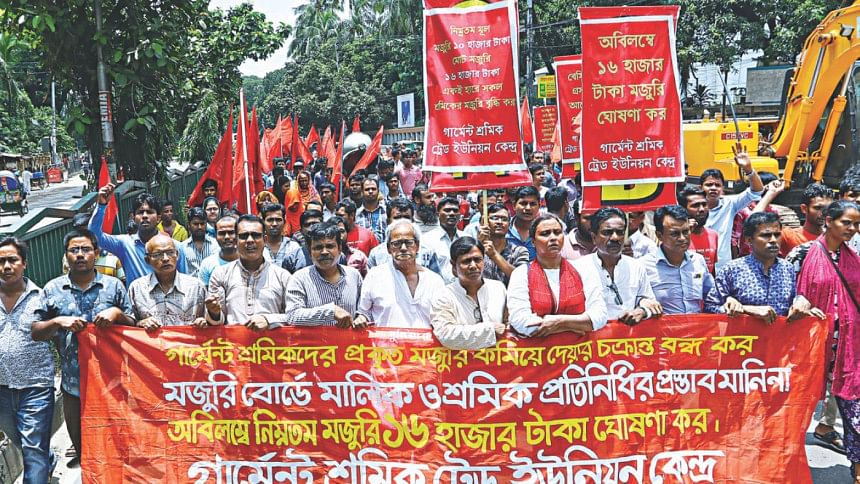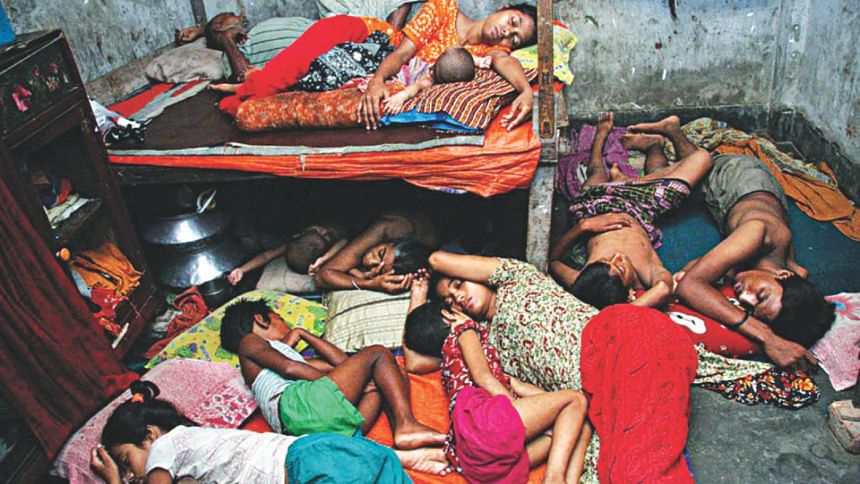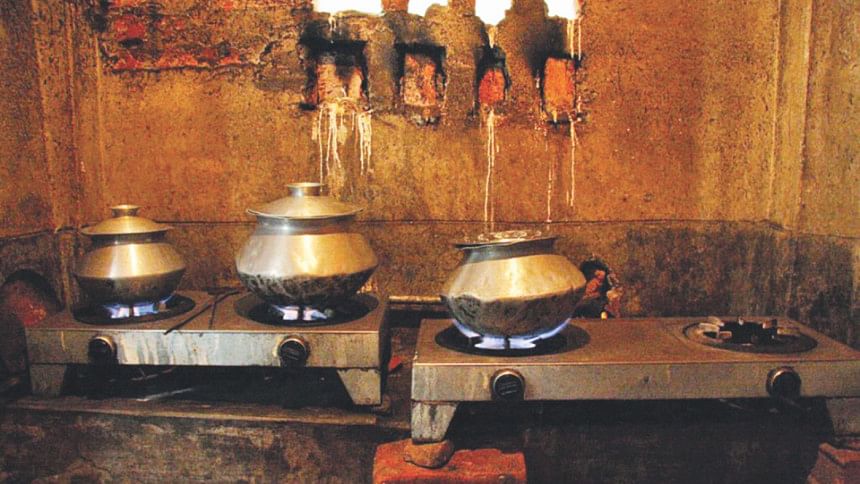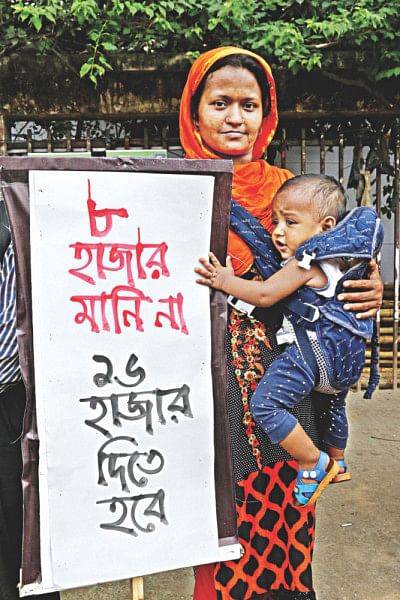Not even the bare minimum

Renu Begum* can remember little of the life she had before she moved to Dhaka and joined a garments factory at the age of 12. Her father, a fisherman, had moved to Dhaka with his family in the early 90s. But there was not much an unskilled fisherman from the village could do in a city teeming with unemployed labourers who, like him, had migrated to the capital, dreaming of untold opportunities.
"He couldn't even cover our rent with what he earned. So one day, a neighbour suggested that a factory was hiring young girls as 'helpers'. That was the beginning of this life," says Renu.
As a "helper", Renu would earn Tk 300 per month. Since then, Renu has worked in at least five factories in different capacities. Now she works as a "folding man" in a factory in Mirpur. From Tk 300, her salary has increased to Tk 7,300 over the last 25 years.
"I've worked and worked, but my situation hasn't really gotten better. We lived hand-to-mouth then, and we live hand-to-mouth now. If I don't work overtime, there is no way I can manage my family," she argues.
The single mother lives in a small room with her younger daughter, Mim and niece, Sadiya, in a house shared by six other families. Tk 3,000—almost half her salary—goes towards paying the rent. She gives Tk 2,000 to her elderly parents, and spends roughly Tk 1,500 on her child, including Tk 800 as school fees. Another Tk 2,000 to 3,000 is spent on food.

"You tell me where that leaves me at the end of the month!" exclaims Renu. "Some months, when Mim is sick or my parents need more money or there is an emergency, I have to resort to borrowing from my sister or neighbours. This is why I work as much overtime as I can. If I don't work at least three hours overtime each day and some weekends, there is no way I can make ends meet."
Unable to meet the costs in a rapidly spiralling economy, Renu takes on as much overtime hours as possible, earning an additional Tk 2,500 – 3,000. Most days, she works a total of 12 hours, spending another hour walking to and from the factory, rickshaws being a luxury she simply cannot afford.
"While minimum wage prioritises subsistence living only, living wage moves towards decent living, beyond subsistence.
Where does the recent minimum wage increase from Tk 5,300 to Tk 8,000—half of what workers and their representatives had been demanding—in the RMG sector leave Renu? For one thing, Renu is yet to know if, and to what extent, her salary would increase. As Amirul Haque Amin, president of the National Garment Workers Federation (NGWF), explains, the wage board has only declared the minimum wage for 7th grade (entry level) workers, who constitute less than 5 percent of the total workforce. "It is a matter of concern that we are yet to know what the wages for those in higher grades would be. It is very much possible that the change in wages would be lower in the higher grades." If that turns out to be the case, the minimum wage increase would essentially be a red herring.
Another red herring is the claim that wages have risen by 51 percent since the last minimum wage increase in 2013. In reality, a 7th grade worker would be earning Tk 6,764 at the end of 2018 anyway because of the five percent yearly increment that each worker is entitled to. This means that the new wage hike represents an increase of only 18 percent. Meanwhile, a recent study published by the Centre for Policy Dialogue (CPD) highlights that the average monthly expenditure for a worker increased by a whopping 85 percent over the last five years. When put into perspective, what really has increased or improved for the workers?
The workers' woe does not stop there. The basic salary of the workers has increased from Tk 3,700 (after increment over the last four years) to Tk 4,100. This essentially means that their basic has decreased as a percentage of their total income. This is significant for garment workers as a lot of their benefits, including their overtime pay, is calculated on the basis of their basic.
As labour activist Kalpona Akter clarifies: "For every overtime hour worked, a worker is entitled to double her hourly pay, which is decided on the basis of her basic salary. For a worker earning approximately Tk 3,700 as basic, overtime per hour would be Tk 35. With the revised minimum wage and a proposed basic of Tk 4,100, overtime per hour would only be Tk 39. For a big part of the workforce which relies on overtime to maintain their families, this is truly devastating." And it's not just overtime, other benefits such as gratuity, service benefits, festival bonus, provident fund etc. which are calculated on the basis of basic wages will be significantly affected as well. For instance, Renu, who must supplement her meagre income with overtime pay, the latest revision may not lead to considerable increase in her earnings at all.

Renu is flustered, to say the least, when I explain the calculations to her. "I couldn't support my older daughter's education on this salary so I married her off at 14. At this rate, I'd either have to marry off my youngest or send her to a garment factory so we have two salaries to live on."
Her 13-year-old daughter, Mim, is good at her studies and Renu had high aspirations for her future. "There is a nice doctor lady at the office. Wouldn't it be nice if my Mim could become a doctor? Or maybe a teacher?" asks Renu wistfully. "Then she could take care of me."
But Renu cannot afford to send Mim to a good school, and had to enrol her at a madrasah instead. "My daughter tells me that I need to send her to a regular school, one that doesn't just teach Arabic. She says there is no future if she studies in the madrasa. But how can I afford anything else?" asks Renu. "She stays at the madrasa from morning till 8 pm and I have to pay only Tk 800. If I send her to a good school, I'd also have to pay extra for her tutors."
Besides, the madrasa ensures Mim's security from morning till the time Renu gets off work. With little time to spend with Mim, Renu has to count on the teachers at the madrasa to look after her daughter.
With debts piling up, and the fragile health of her parents adding to her economic burden, it seems it's only a matter of time before Mim is forced to follow the footsteps of her sister or mother. Either way, Mim too cannot escape the cycle of poverty she was born into.
Meanwhile, the RMG sector continues to grow, with the country's export earnings from the apparel sector registering an 8.76 percent growth and reaching USD 30.61 billion in 2018.

Whose vulnerability is being addressed?
Labour activists argue that the minimum wage has been decided taking into consideration solely the industry's anxieties, disregarding not only the workers' demands but also their lived realities.
Siddiqur Rahman, the president of Bangladesh Garment Manufacturers and Exporters Association (BGMEA) and owner's representative of the wage board, however, believes that there is no truth to the claim that workers have been hung out to dry.
He speaks to me at length about the challenges that the industry faces, highlighting, in particular, decreasing prices of RMG products in the world market. He explains that the absence of necessary infrastructure, such as port facilities, and severe limitations in design and innovation (as the industry, for the last five years, has had to focus on structural safety and remediation) are holding the industry back. When asked if workers should have to pay for the weaknesses of the industry, he exclaims, "How many industries in Bangladesh pay as much as USD 100 to workers with no skills.... who learn their trade by destroying our thread and machines?"
He also adds that given the low productivity of our workers, the wage declared is more than fitting. I ask if Bangladeshi workers are inherently less productive than workers in other countries, to which he admits, "No, the problem is not with the workers, but with managing these workers. We need so many supervisors and mid-level management to maintain efficiency. The man to machine ratio in Bangladesh is higher than anywhere else in the world." Again, the question of whether workers should bear the brunt of mismanagement remains unanswered.
Anu Muhammad, professor of Economics at Jahangirnagar University, argues that the claims of the garment owners do not match the facts. "The growth rate of the industry and rising income from exports show the increasing capability of the industry and rising productivity of the workers. Every time the issue of wage increase comes, owners argue that the industry will collapse if wage increases," he says. "But since 1994, wages of workers increased six times (in taka), while export earnings from garments increased 14 times (in USD). Prices of items from Bangladesh are decreasing because of mad competition among owners to get orders. BGMEA can fix minimum prices of every item."
Additionally, ask labour leaders, if wage increases make an industry uncompetitive, how has the RMG sector continued to flourish in other major export-producing countries, such as China, Cambodia, India, Vietnam or the Philippines, all of which already pay considerably more than the proposed wage of USD 100?
And while we continue to focus on the vulnerability of the industry in mainstream media, what about the vulnerabilities of our workers? The government's own Household Income and Expenditure Survey 2016 put the average household expenditure at Tk 15,715; and the workers, even with the raise, will fail to meet this.
"Wages in Bangladesh are extremely low and irrational. The CPD study shows that the minimum cost of living of a workers' family is more than Tk 22,000. Therefore, the demand for Tk 16,000 – 18,000 for minimum wage per month is not a demand for wage increase, but a demand to take the primary step towards wage rationalisation," opines Anu Muhammad.

Living beyond subsistence
Minimum wages in Bangladesh do not reflect a living wage necessary for a worker to live a dignified life. The Universal Declaration on Human Rights adopted by the United Nations states in Article 23 states that 'Everyone who works has the right to just and favourable remuneration ensuring for himself and his family an existence worthy of human dignity, and supplemented, if necessary, by other means of social protection' (UNDHR 1948). A living wage is defined by the Asia Floor Wage Alliance, a global coalition of trade unions, workers rights and human rights organisations, as wage that covers basic needs, including nutritious food, clean and safe housing, education, clothing, as well as a small amount of discretionary income to satisfy cultural and educational needs; it is calculated based on regular working hours, not including overtime. It should also be enough to support workers' dependents. According to the coalition, the living wage of Bangladesh, calculated in terms of the Purchasing Power Parity (PPP), was Tk 37,661 in 2017.
Even the most liberal calculations of minimum wage in Bangladesh seems to take into consideration only the existing standard of living of families, not the standard of living that workers should aspire to—a standard of living that does not include being in debt to meet basic needs, with an income which can support dependants without two or more members also working to meet the rising costs. While minimum wage prioritises subsistence living only, living wage moves towards decent living, beyond subsistence.
CPD's survey shows that, at the existing standard of living, at least 17 percent of Bangladeshi RMG workers sleep without a bed at night, 16 percent do not have ceiling fans in their homes, 86 percent workers have to share toilets with other families and 45 percent were unable to save anything from their earnings of their households. Another survey of 200 workers conducted by Bangladesh Garments Sramik Shamhati this year found that 34 percent of workers do not eat big fish, 19 percent do not eat beef or mutton, and 17 percent do not eat chicken, even once a month.
The survey found that a worker spends on average Tk 1,110 per person on food. "According to an estimate by the Nutrition and Food Science Department of University of Dhaka, a person needs food intake amounting to 2800 kilocalories to work for eight hours," quotes the report. "At current market prices, the amount of money that is required to meet this nutritional need is Tk 3,270 per month. This means that workers currently only have the ability to spend one-third of the required amount to meet their caloric needs." The calculation is still conservative at best, because it does not accommodate the costs of food with higher nutritional value, like meat or fruits.
These numbers clearly highlight that we are nowhere close to having a real discussion on living wage. And it's just the government and factory owners who need to change their perspective, but also major buyers, who, while making lofty promise to institute living wages in their global supply chain, have thus far failed to make any concrete commitment towards ensuring dignified lives and better pay for workers. Rather, brands continue to pit developing countries against each other in the infamous "race to the bottom". As we mull over the possibilities of a better future for the country and the vast majority of workers who make it what it is, we owe it to them to aim higher than the lowest common denominator.
*Parts of the interview with Renu Begum were published in Fönstret Magazine, Sweden.





Comments